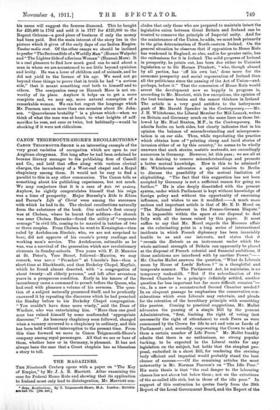CANON TEIGNMOUTH-SHORE'S RECOLLECTIONS.* CANON TEIGNMOUTH-SHORE is an interesting example of
the very great varieties of occupation which are open to our Anglican clergyman. Not long after he had been ordained he became literary manager to the publishing firm of Cassell and Co., and held that office along with various clerical charges, the incumbency of a West-end chapel and a Royal chaplaincy among them. It would not be easy to find a parallel to this in any other communion. The Canon tells us something about his publishing experiences, but not much. We may conjecture that it is a case of $oic txl Vaxrap. Anyhow, he rightly congratulates himself that his reign was a time of prosperity. Major Burnaby's Ride to Shiva and Farrar's Life of Christ were among the successes with which be had to do. The clerical recollections naturally form the substance of the book. Our author's first curacy was at Chelsea, where he learnt that soldiers—the church was near Chelsea Barracks—found the utility of "corporate courage " in civil life, coming to be married in batches of two or three couples. From Chelsea he went to Kensington—then ruled by Archdeaaon Sinclair, who, we are not surprised to hear, did not approve of his curate's penny readings and working men's service. The Archdeacon, estimable as he was, was a survival of the generation which saw revolutionary elements in Sunday-schools. Two years with F. D. Maurice at St. Peter's, Vera Street, followed—Maurice, we may remark, was never "Preacher" at Lincoln's Inn—then a short time at Blackheath, and than Berkeley Chapel, Mayfair, which he found almost deserted, with " a congregation of about twenty—all elderly persons," and left after seventeen years in a prosperous condition. Early in his tenure of the incumbency came a command to preach before the Queen, who had read with pleasure a volume of his sermons. The ques- tion of a subject naturally presented itself, and be prudently answered it by repeating the discourse which he had preached the Sunday before to his Berkeley Chapel congregation. " You couldn't have done more wisely," said the Dean of Windsor, who was entertaining him. "More than one good man has ruined himself by some confounded appropriate discourse." An honorary chaplaincy soon followed, changed when a vacancy occurred to a chaplaincy in ordinary, and this has been held without interruption to the present time. From this time forward we move in Canon Teignmouth-Shore's company among royal personages. All that we see or hear of them, whether here or in Germany, is pleasant. It has not always been the case that a Court chaplain has so blameless a story to tell.






































































 Previous page
Previous page